Cosmologies of Ghosting
“The crack: a fissure which would be constitutive of the self, or would reconstitute itself as the self, but not as a cracked self.” -- Maurice Blanchot
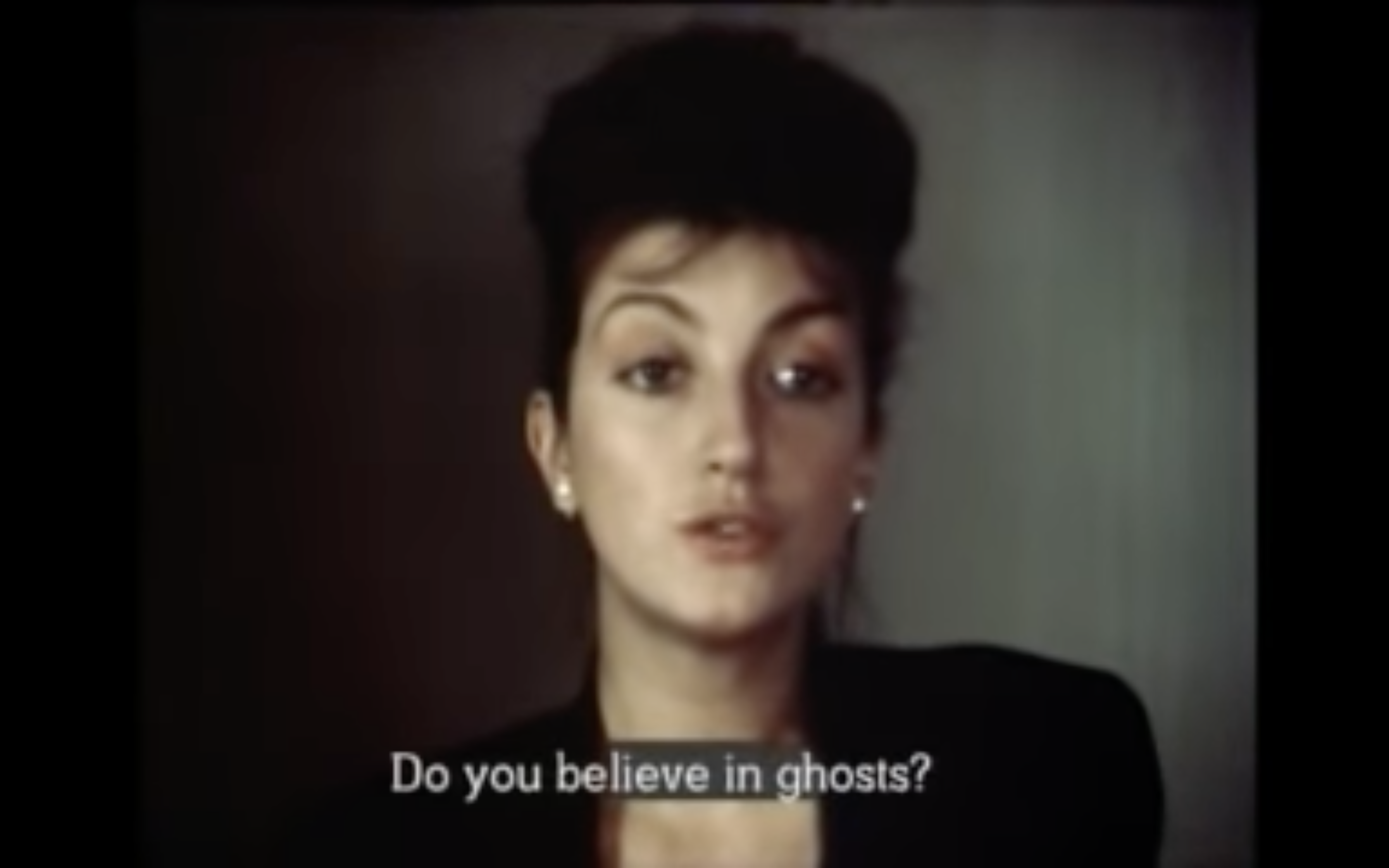
TODAY
4:33pm 4:54pm 4:55pm 5:01pm 5:01pm 5:01pm
I’m in a small beach town in New Jersey and winter’s about to start. The sun shines on an unlit phone screen and nearby, I wait. A new rhythm, engendered by waiting, begins. The sun’s gleam is insidious, mad. I glance back and forth between sun and screen, sun and screen, then squint into the sun before turning back to the screen. The rhythm hooks the sun and brings it closer, madder, blurrier. Sun and screen fuzz into one yellow-blue hue. I hold the screen-sun up to my face and wait. Neither the phone nor the sun rings. I’ve recently returned to Ingeborg Bachmann’s 1971 novel Malina, whose unnamed narrator says:
- I keep the black telephone in view while I read, before going to sleep, when I place it next to the bed. Of course I could exchange it for a blue, red or white one, but it won’t ever come to that, since I won’t allow anything else in my room to change, so that nothing distracts me except Ivan, the only new thing there is, and so nothing diverts my attention from waiting, as the telephone stays still.
- Vienna is silent.
TODAY
5:02pm 5:02pm 5:02pm
During the first decade of the 21st century, ghost became a verb. “There are no longer any haunted houses, but there are haunted beings,” says Anne Dufourmantelle in Fighting Theory. As I wait by the glare of my phone, I notice a portion of a golden candy wrapper on the ground, a kind of sun. I anticipate a crackling or ringing that might disturb the repetitive rhythm. I wonder about ghosts and those beings they haunt. Wikipedia:
- Ghosting is a colloquial term used to describe the practice of ceasing all communication and contact with a partner, friend, or similar individual without any apparent warning or justification and subsequently ignoring any attempts to reach out or communication made by said partner, friend, or individual. The term originated in the early 2000s. In the following decade, media reported a rise in ghosting, which has been attributed to the increasing use of social media and online dating apps.
The digital ghost produces silences which beget limitless readings, vectoring the perpetual present of digitization to a high-pitched waiting room. In digitized times, to ghost is to disappear and to haunt is to make indirect contact after disappearing, usually through social media: liking, watching, etcetera. The algorithm may overcode and augment other rhythms. Planets wandering around the exploded star of the sun, a ghost may begin to orbit. As the digital panopticon produces viciously instantaneous hauntings, these turbo-ghosts go fast: loop-loop-loop.
Bachmann’s Malina weaves a labyrinthine love triangle in a corner of postwar Vienna. The narrator is in love with Ivan and lives with Malina. The first section, “Happy with Ivan,” tells of how the world can feel changed-charged by desire, a name can be a password, a cure for decay, a way to unlock a blocked flow, get devoured, disappear, become multiple. Bachmann writes: “It’s Ivan. Ivan, again and again.” She describes a virus which moves between bodies and locations, love or sickness or lovesickness. Often, she waits.
TODAY
11:10am 11:10am 11:10am 11:13am 11:34am 7:01pm
Winter is approaching. In Matter and Memory, Henri Bergson writes, “Questions relating to subject and object, to their distinction and their union, should be put in terms of time rather than of space.” It’s easier to notice time when it breaks, loops, jumps, disrupts. Hamlet shows how ghosts derange time, bones falling from sockets: “The time is out of joint…” How to communicate with a ghost? Hamlet’s Marcellus believes Horatio will know what to do: “Thou art a scholar, speak to it, Horatio.” But scholarship alone won’t suffice to bridge the gap between human and specter or get time back on its hinges. The ghost ghosts Horatio. Later, alone with Hamlet, the specter speaks: “Mark me.” Listen up. Unlike the Hamletian specter, the digital ghost does not speak and instead, resists communicating that there will be a break, a break in communication or a breakup. And so, the ghosted moment is electrified by hopes of ghost talk or ringing phones, a scene lit by digital blue and yellow sun.
Malina happens in the time of “today.” For the narrator, “today” is an “impossible word.” She’s afraid “today” is “too gripping, too boundless…” “Today” unfurls in a particular part of Vienna which the narrator describes as a “magnetic field” that she can’t escape from as the world’s material gets infused by desire, its thrills and pains and gaps: “So Ivan doesn’t have any time, and the receiver feels like ice, not plastic, but metal, and it slides up to my temple, since I hear he’s hanging up, and I wish this sound were a shot…” Trans-corporeal exchanges pervade Malina. In Bodily Natures, Stacy Alaimo describes trans-corporeality like this:
- By emphasizing the movement across bodies, trans-corporeality reveals the interchanges and interconnections between various bodily natures. But by underscoring that trans indicates movement across different sites, trans-corporeality also opens up a mobile space that acknowledges the often unpredictable and unwanted actions of human bodies, nonhuman creatures, ecological systems, chemical agents, and other actors.
These mobile spaces and moving subjects might also counter forces which exert power over landscapes and people: “trans-corporeal subjects must also relinquish mastery as they find themselves inextricably part of the flux and flow of the world that others would presume to master.” I breathe in the cold air and exhale, watching my breath travel across asphalt, mounds of trash packed in black bags, and onto the empty beach where it mixes with darkening water.
TODAY
9:00am 9:06am 9:14am 10:44am
The phone, blue and smooth, bears weird witness to my waiting, even as it’s part of the rhythm, making the rhythm. Time passes in loops marked by picking up the phone and sliding it across the room or walking around outside, phone at my side. I play the same songs on repeat and watch the same movies, frozen. To achieve a freeze frame in film, an image is repeated over and over again, a moving image made still.
Today-today-today.
Desire also deranges time and space. In Eros the Bittersweet, Anne Carson writes: “The blind point of Eros is a paradox in time as well as in space. A desire to bring the absent into the present, or to collapse far and near, is also a desire to foreclose then upon now.” Digital mediums tend already to collapse far and near, eros translated into ones and zeros, then-now.
On screen, I click on a name. The name of my ghost. An advertisement appears. I click the X, then go outside. Is there an outside? Outside, I speak to a friend and we wonder if ghosting is a symptom of 21st century capitalism, of market-regulated communications, pressures to be ever-available, networked, connected, online, today’d. I look at the sun, my phone, and then peer around the corner where pink scribbles of chalk are fading into the dirty sidewalk. Under the screen-sun’s beams, my breath visible, I wait for a rupture, for the ghost to speak or change forms. In this state, there’s weird magic. Time might be reversible. The ghost might appear at any moment. Standing over the dissolving pink chalk, metallic gleam of old candy wrappers lighting his face.
TODAY
8:16pm 8:16pm 8:29pm 9:19pm 11:07pm
Winter’s threshold seems to be looping. I read Matter and Memory where Henri Bergson writes, “All that my vision perceives is verified by my touch.” My ghost is not verifiable by touch. For Bergson, pure memory belongs to the realm of the virtual and the virtual and the actual are both real, always interacting. Bergson writes: “For pure recollection is, by hypothesis, the representation of an absent object.” The virtual and actual are not opposed. They become each other, co-present as the absent object exists in the realm of the virtual while interacting with the actual. I go for a walk, virtual recollections seeping into the actual moment. I’m reflected in a glass door, a crack at the corner. I fog up the glass. I think my ghost might be nearby. False alarm.
In his essay “The Virtual and the Actual,” Deleuze uses The Lady from Shanghai as an example of this perpetual interplay of virtual and actual: “in which the mirror takes control of a character, engulfs him and leaves him just as a virtuality; hence, there is coalescence and division, or rather oscillation, a perpetual exchange between actual object and its virtual image: the virtual image never stops becoming actual.” Is the ghost a virtual image that never stops becoming actual? Haunted, I’m left with strange virtual residues of pure recollection, erotic and bizarre past-future fogs. Today.
TODAY
5:07pm 5:18pm 5:55pm 6:01am
The room is lit by blue sun. The blue hour comes after sunset and can indicate the end of work and the beginning of rest as the sun disappears, its last moments showing low frequency blue, eyes always adjusting.
In Anti-Oedipus, the first volume of Capitalism and Schizophrenia, Deleuze and Guattari map a materialist psychiatry, a schizoanalysis wherein “Desire is a machine and the object of desire is another machine connected to it.” Theirs is a machinic desire not because it’s strictly utilitarian or technological but because it machinates, ever flowing-breaking and processual. The first chapter, “Desiring-Machines,” claims that we never desire alone – that desire is beyond subject-object and is always also social, political, geographical.
As an experiment, I attempt to delink desire from the triangulation of subject, object, third thing. Not: me, my ghost, and whatever stands between us – vast expanses of internet and/or physical miles and/or time. But: a zone and a process which surrounds us as we produce it. Many of us. Smells, bricks, electric connections and dispersals, a field, trash, chalk, curtain, glass door, street, bolt of lightning from a cloud, memory clicked on and cloud-stored, letters and emails and text messages assembling a street down which I walk. How does this material desire function? According to Deleuze and Guattari, it functions by breaking down. It flows as it breaks, breaks into flows. Cupid’s arrow, refashioned, flies through the air.
TODAY
3:03am 3:11am 3:14am
In Hamlet, the ghost comes undone from the (dead) physical body, doomed to wander. In digital ghosting, the ghost is not the specter of a deceased person (Hamlet’s dad) nor a political doctrine (Marxism) as in Derrida’s Specters of Marx which invokes Hamlet and Karl Marx, but something else. Somewhere in space, a person animates the digital ghost, using digits to click, scroll, watch. Alive but elsewhere, the space isn’t between body and spirit, but avatar and person.
The Berlin Wall, which the East German government described as an “anti-Fascist protective rampart,” stood from 1961-1989. In 1993, Jacques Derrida reckoned with the collapse, speaking about the specter of communism, mourning, and the future at a conference at the University of California, Riverside. The lectures became the book Specters of Marx: The State of the Debt, the Work of Mourning, and the New International (1994). Derrida says that with the demise of communism comes the specter of Marx, a ghost that we must return to in order to challenge what Francis Fukuyama famously called “the end of history.” Derrida writes: “Repetition and first time: this is perhaps the question of the event as question of the ghost. What is a ghost?”
Re might be the ghostliest prefix: again, back, anew, against.
A decade earlier, Derrida appeared in the film Ghost Dance (1983)[1] which shows how inner lives unravel alongside foreclosed futures, fossilized outlines, and fractured time as machines proliferate ghosts. The narrator: “To fall is to pass between. To fall is to touch but never make contact. To fall is to fail and succeed at the same time.” What is the tactility and hue of the wait? What do ghostly and haunted bodies do?
TODAY
12:01am 12:06am 12:05am 12:05am
Snow falls and melts as it arrives on the sidewalk. The pink scribbles of chalk are gone and there’s new trash, wet from soft snow. It’s nighttime in my memory and actual surroundings. In Creative Evolution, Henri Bergson says that we experience duration most vividly while we wait. His example involves waiting for a sugar cube to dissolve in a cup of water. Elizabeth Grosz writes about Bergson’s sugar duration in The Nick of Time: “My waiting consists in the failure of its dissolving to coincide with my desire.” How to apply this to real life, to the wintry mix falling all around, the crack in the glass, the blue screen lighting my face and the face of my friend as we discuss ghosts, as we wait?
I mistake the sound of the wall creaking for my phone vibrating. In Ghost Dance, the phone rings. Derrida is amused. Nothing’s melting. He doesn’t seem to be waiting. “Now the telephone is the ghost,” says the philosopher. He picks it up, speaks. Ghosts are part of the future and new technologies “enhance the power of ghosts and their ability to haunt us.” What is the future of my ghost, our ghosts? In her essay on Derrida’s Specters of Marx, “Shakespeare Ghosting Derrida,” Helene Cixous writes: “One cannot imagine anything more ghostly. The Ghostest ghost, the lostest ghost, o, o, o, o, oblivion, oblivion. Without farewell.” No goodbyes. Instead, many o’s, openings, loops: o o o o o o o o o o o o o o o o o o o o o o o o o o o o o o o o o o o o o o o o o o o o o o o o o o o o o o o.
In Malina, the narrator waits by her phone. The telephone and the narrator form an animated mass. Its cords tangle around her as she awaits a sound, the receiver hooks up to her temple, a cold gun or an ice cube melting as it makes contact with skin. Throughout the novel, telephone tics and whimpers, cries out, has outbursts, dies, screeches:
-
“The phone whimpers quietly in the middle of the night, it wakes me with seagull cries…”
-
“I hope Malina is waiting for me at the station, but there’s no one there, and I have to phone, except I don’t like calling from train stations…”
-
“I hope Malina is waiting for me at the station, but there’s no one there, and I have to phone, except I don’t like calling from train stations…”
-
“...waiting by the phone until midnight…”
-
“If I, for example, came home this evening tired, but still stayed up to wait for a phone call…”
-
“...who knows what a telephone does and what its outbursts should be called?”
-
“And how long have I been living with a dead telephone? Whenever the phone screeches or cries out, I still sometimes get up with a foolish hope, but then say: Hello? with a disguised voice…”
Desire, a waiting room exuberant, insidious, or otherwise, may overcode geographies, alter and texturize atmospheres as time ruptures and rhythms switch. Hello?
TODAY
7:47am 7:59am 8:09am 11:07am
Bachmann’s Malina shows how desire can liberate and also get captured by fascistic forces. In an interview before her death, Bachmann speaks about the book and its relationship to war and fascism: “It doesn't start with the first bombs that are dropped; it doesn't start with the terror that can be written about in every newspaper. It starts with relationships between people.” In a 1972 interview in L’Arc, Felix Guattari speaks about the revolutionary notion of desire outlined in Anti-Oedipus, the spread of fascism, and oppression:
- We set against this fascism of power active, positive lines of flight, because these lines open up desire, desire’s machines, and the organization of a social field of desire: it’s not a matter of escaping ‘personally,’ from oneself, but of allowing something to escape, like bursting a pipe or a boil. Opening up flows beneath the social codes that seek to channel and block them. Desire never resists oppression, however local and tiny the resistance, without the challenge being communicated to the capitalist system as a whole, and playing its part in bursting it open.
How to allow something to escape, tiny resistances that burst? Near the novel’s end, the narrator tells us: “Malina looks around meticulously, he sees everything but no longer hears.” Malina himself has become a kind of eerie panopticon and when the phone rings, we hear only his end of the conversation: “There is no woman here, I’m telling you...”
In Glitch Feminism, Legacy Russell invokes the glitch, a technical error that’s part of “machinic anxiety, an indicator of something having gone wrong” as liberatory strategy, a way to play and construct multiple selves. Russell writes: “We want a new framework and for this framework, we want new skin. The digital world provides a potential space where this can play out.” The glitch works by breaking an already broken system.
TODAY
3:04pm 3:09pm 3:12pm 3:28pm 4:05pm 4:15pm 4:50pm
In Malina’s final scene, the narrator disappears into a crack in the wall, merging with the environment. Silence: “It’s a very old wall, a very strong wall, from which no one can fall, which no one can break open, from which nothing can ever be heard again.” Is the crack which opens and disappears her a shelter and/or a snare? Becoming-wall, the narrator says: “It was murder.” The narrator has been silenced, murdered: “There is no woman here, I am telling you…” Simultaneously, perhaps she’s escaped from the “magnetic field” that she was stuck in for all of “Today.”
What are the gaps and links between the silencing crack in the old wall and the potentially liberatory glitch that Russell writes about in her book? Between silencing each other and opening up flows beneath social codes? I’m attempting to imagine relationships and societies that force neither speech nor silence, flights from frozen loops of time and tiny resistances away from market-regulated communications and time, its hauntings, ads, noise, loops, and manufactured desires. In The Expulsion of the Other, Byung-Chul Han writes about a different sort of time:
- What is needed today is a temporal revolution that ushers in a completely different time; we must rediscover the time of the other. Today’s temporal crisis is not acceleration, but rather the totalization of the time of the self[…]unlike the time of the self, which isolates and separates us, the time of the other creates a community. It is therefore a good time.
This “time of the other” may engender resistant cracks instead of murderous silencings. A space between. Something new from a smashed loop, another cosmology. Or, time differently hinged. I’m looking at the glass door. I take a photo. It snows. I drop my phone. When I scroll or tap, flecks of shimmering screen coat my fingers then disperse.
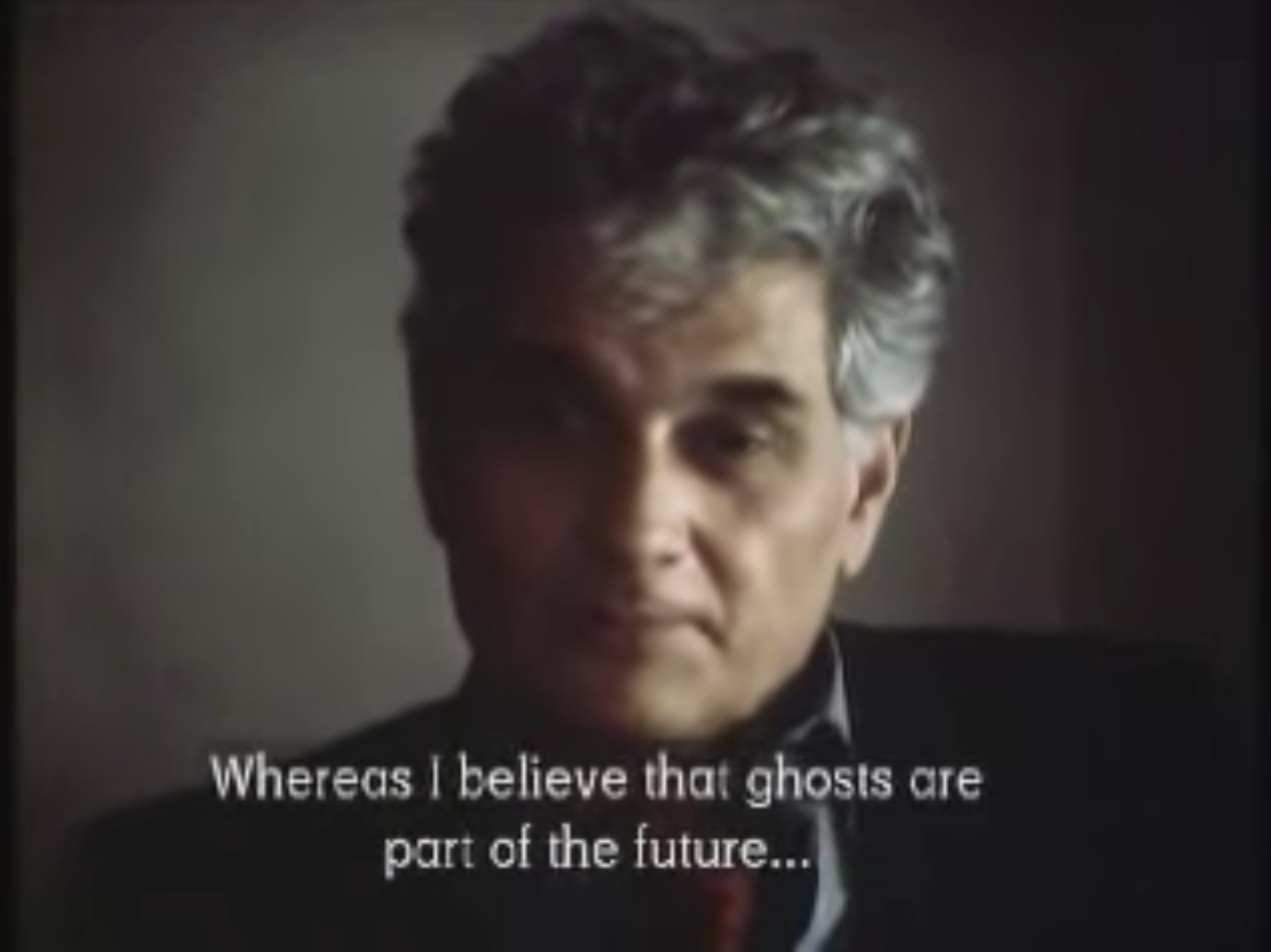
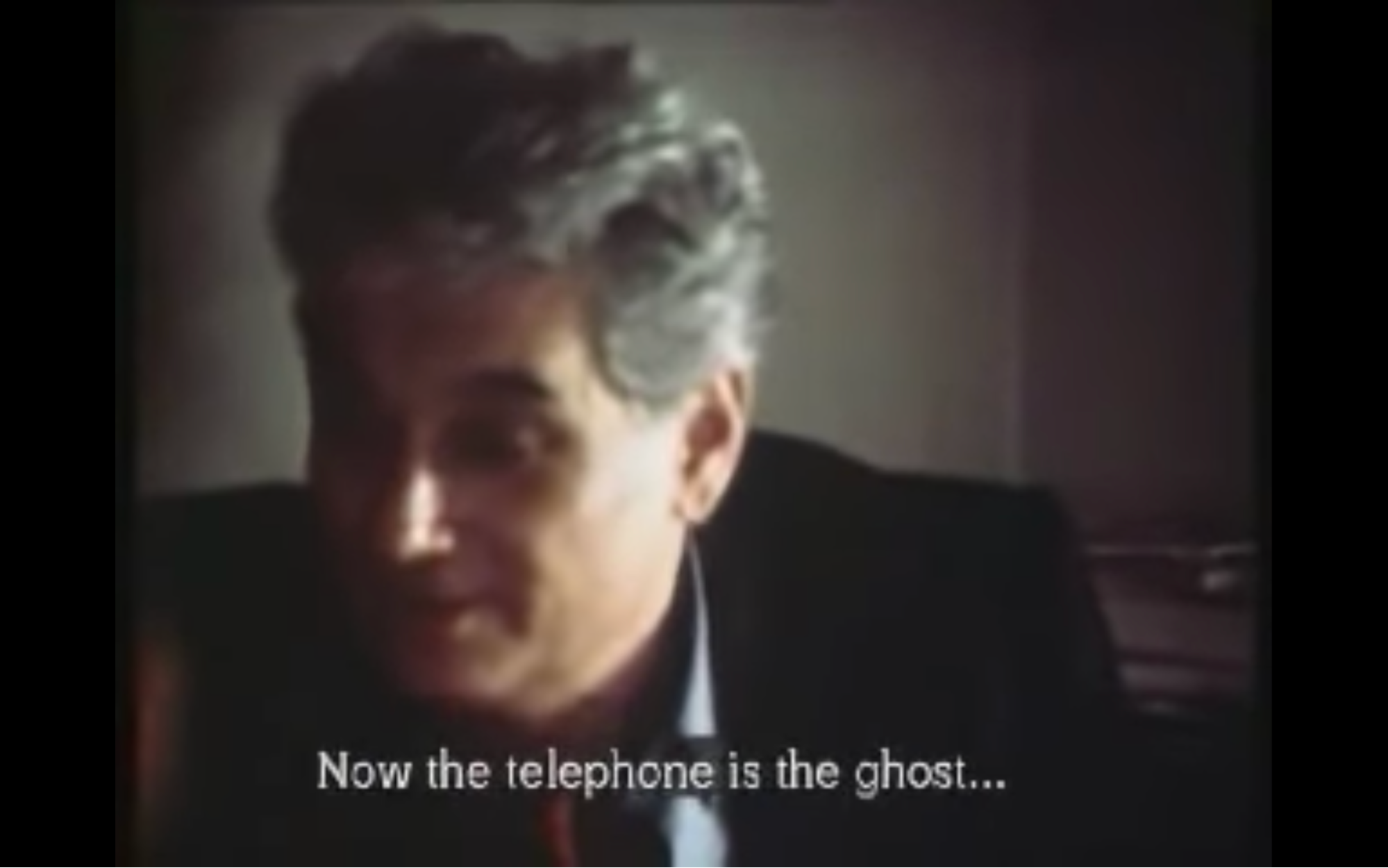
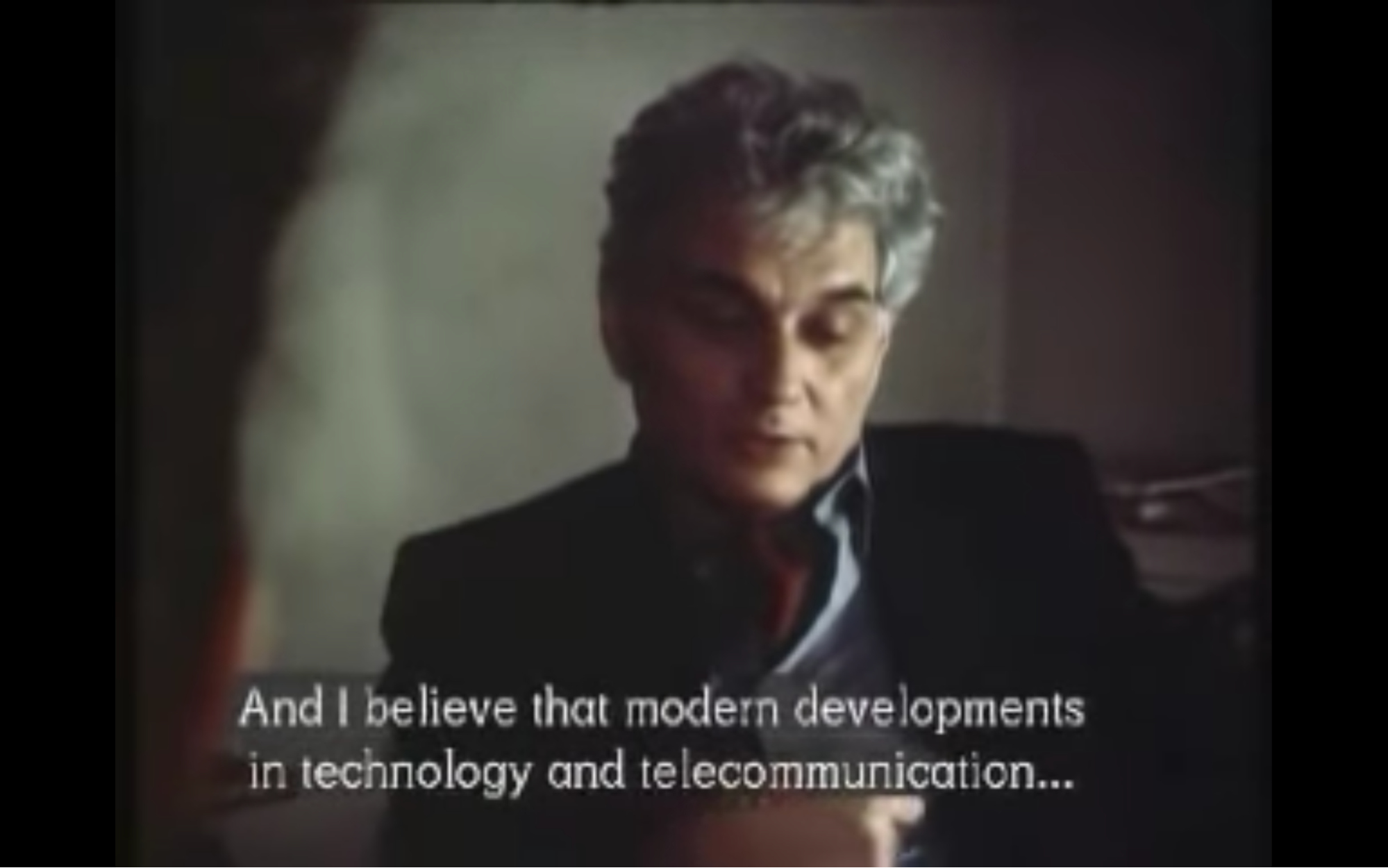
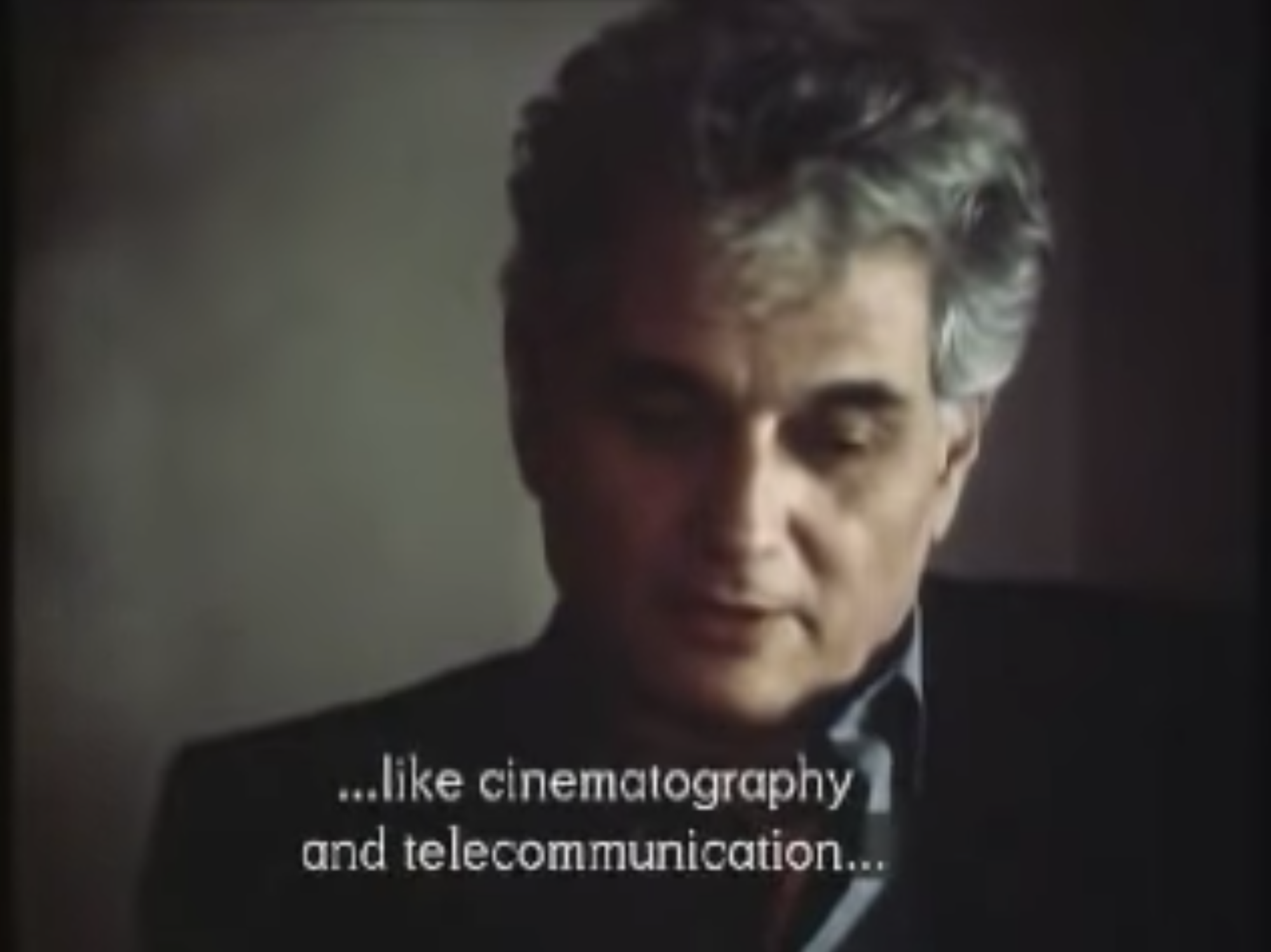
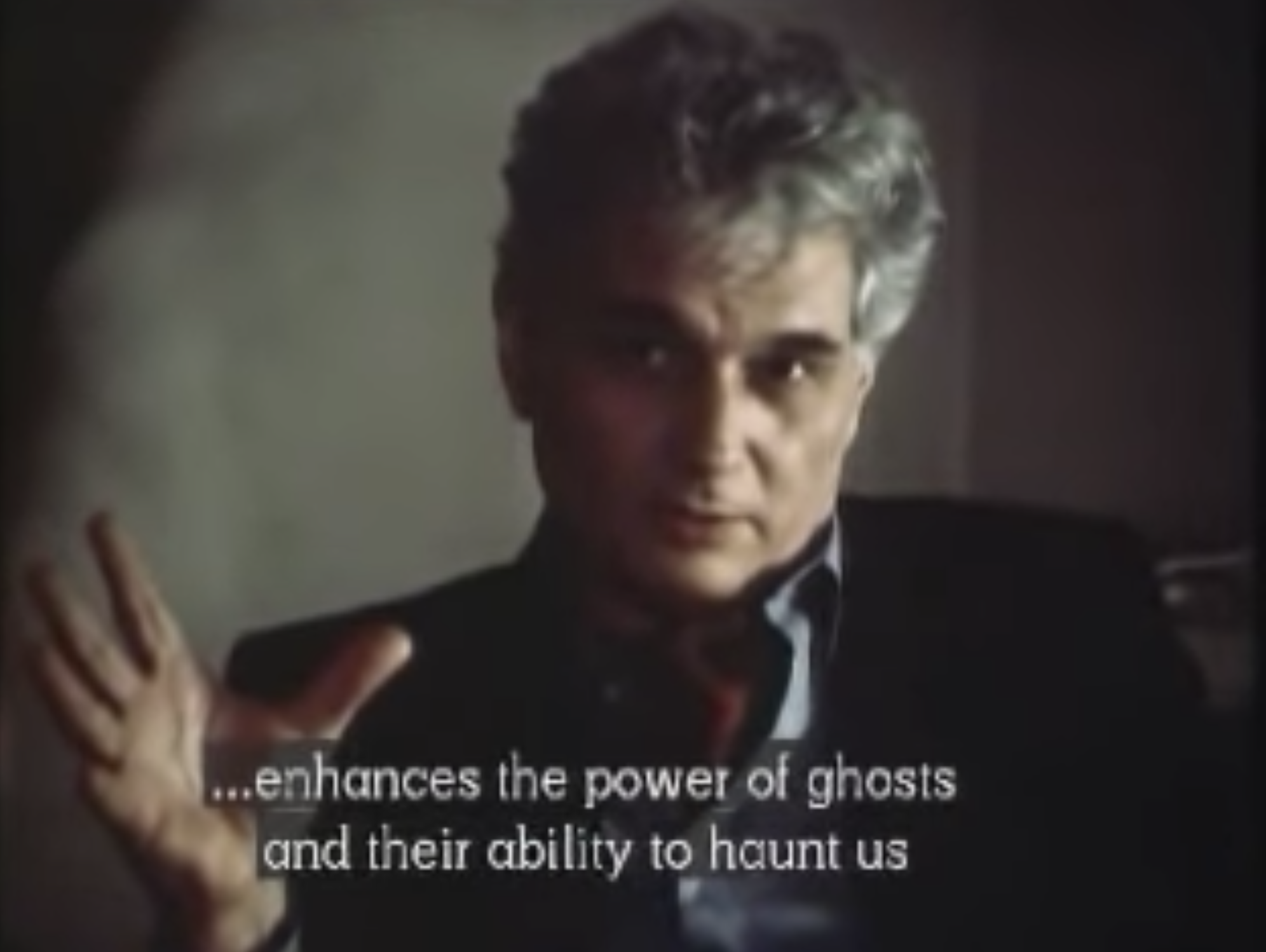
Notes
[1] Jacques Derrida in Ghost Dance, dir. Ken McMullin, 1983.
